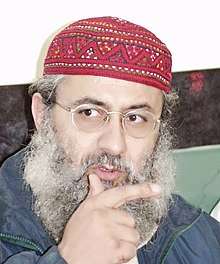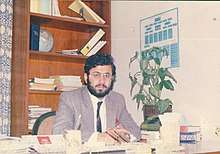Abdul Rashid Ghazi
| Abdul Rashid عبدالرشيد | |||
|---|---|---|---|
 | |||
| Born |
January 29, 1964 Islamabad, Pakistan | ||
| Died |
July 10, 2007 (aged 43) Lal Masjid, Islamabad, Pakistan | ||
| Cause of death | Gunshot injury | ||
| Nationality | Pakistani | ||
| Alma mater | Quaid-i-Azam University | ||
| Children |
Haroon Rashid Ghazi Haris Rashid Ghazi Hamza Rashid Ghazi | ||
| |||
Abdul Rashid (عبدالرشيد; ca. 1964 – July 10, 2007)[1] was an Islamist Pakistani fundamentalist and a human rights activist, son of Muhammad Abdullah Ghazi, and younger brother of Maulana Abdul Aziz Ghazi. He was descended from the Sadwani clan of Mazari tribe in the town of Rojhan in Rajanpur, the border district of Punjab province of Pakistan.[2]
Abdul Rashid was killed during Operation Silence after Pakistan Army Special Operations Commandos' teams stormed the Madrasah he and his students had been using.
Early life
In his youth Abdul Rashid defied his father's wish that he receive formal Islamic education as he wanted to live a modern life. He completed his MSc in International Relations from Quaid-e-Azam University Islamabad in 1987–1988.[3] According to one of his professors, "He was a normal, modern student who was well adjusted to a co-educational system."[3]
Work for UN
After taking an M.Sc. in history, he obtained a job at The Ministry of Education in Islamabad, and later worked with UNESCO, a specialized agency of the United Nations (UN) based in Paris, as Seventeenth Grade Officer.[3]

Soviet Afghan War
During The Soviet Invasion Of Afghanistan His Father Muhammad Abdullah Ghazi Played A Major role in Recruiting and Training mujahideen,And In 1998, Abdul Rasheed Ghazi And His Father Maulana Abdullah Ghazi Met Bin Laden, Ghazi Recalling The Events Once Said Stated : "The Meeting Inspired Me To Work Hard For The Establishment of Islam" He Further Recalled That At The End Of Meeting He Picked Up A Glass From Which Bin Laden Was Drinking Water And Drank It, An amused Bin Laden Asked Ghazi, Why He Did That? To Which Ghazi Replied : I Drank From Your Glass So That Allah Would Make Me A (Great) Warrior Like You
Assassination of father
A week after Ghazi and His father returned from Kandahar, on Saturday October 17, 1998, Ghazi's father Who Had a routine every day whereby he would walk to His seminary (The Al Faridia University in Sector E-7 Of Islamabad) for giving lectures , At Noon When He Returned His Elder Son approached him and spoke to him. When Maulana approached his house, a Man standing in front of the door walked towards him and pulled out a gun and opened fire until the magazine was empty, badly injuring Maulana. Afterwards, he fired at Abdul Aziz Ghazi , who barely escaped death. The assassin escaped with the help of an accomplice waiting outside in a car. Maulana Abdullah died of his injuries on the way to the hospital.
Abdul Rashid Ghazi lodged the FIR and the police investigated the case. After a relentless effort, a man was arrested and afterwards, during ID Parade Several Eye witnesses identified the assassin. However, he was released the next day without reason. Abdul Rashid Ghazi protested against the release and warned the police of legal action if the suspect was not arrested soon. With Ghazi increasing pressure on police, a military officer asked Ghazi to withdraw the case or face the fate of his father.According to his friend, this was turning point in Ghazi's life, and he became disillusioned him with system.
Post 2001
Abdul Rashid Ghazi first came to the scene in the year 2001, when the religious parties of the country announced an organization for the defense of Afghanistan against the American invasion. Abdul Rashid Ghazi, who had now been a Maulana, did not suddenly have any religious religious education and degree, was considered the main leader of Mawlawi's alliance. Everyday in Islamabad, there would be a rally and Maulana Abdul Rashid Ghazi addressed in the emotional way standing with other religious leaders.
In August 2004, The Pakistan government claimed He Was involved in a plot against the president, the army and parliament; however this was later refuted by the government minister for religious affairs And Later On By The Government.[4]
Activism
Ghazi was a well-known activist against Enforced disappearances in Pakistan, and in 2004 , he founded Defense of Muslim Rights, and Later On in 2006, he Co-founded Defence of Human Rights Pakistan. Alongside human rights activist Amina Masood Janjua And Khalid Khawaja
Assassination attempt
In early 2005, one morning just after dawn, Ghazi was returning from teaching a class at The Al Faridia Seminary (which he managed and was the chancellor of). He was driving along a four-lane highway in the shadow of the Margalla Hills when he noticed that someone in a nearby car was waving a gun at him. Ghazi fired warning shots from his licensed pistol, confusing the assassins, after which they sped away.
Death And Legacy
After negotiations Allegedly failed, the military decided to take an action against, and it began as Pakistan Army Special Forces (SF), Pakistan Army Rangers, and Special Service Group (SSG) stormed the mosque. Ghazi himself remained in seminary with a few students. He called for a safe way in which he would Not be humiliated like his brother, but government denied his requests. The Pakistan Ministry of Interior reported that he was killed on 10 July 2007 during Operation Silence. According to the ISPR, the body of was found in the basement of the Lal Masjid.
A few days after his death, his famous saying "We can be martyred but we will not surrender" was featured as Quote of the Day on Time's website.
On July 14, a few days after the Lal Masjid siege, Osama bin Laden released a tape. He was shown with a fatigued expression. "We in al Qaeda organization call on God to witness that we will retaliate for the blood of ... Abdul Rashid Ghazi and those with him against Musharraf and those who help him, and for all the pure and innocent blood," he said.
On September 20, 2007, Bin Laden released a new tape called "Come to Jihad" with his voice over previously released footage of him. In the tape bin Laden called on Pakistanis to overthrow President Pervez Musharraf, promising what he called retaliation for the storming of the Red Mosque.
References
- ↑ Cameron-Moore, Simon "Pakistan counts costs of bloody end to mosque siege" Reuters, 10, July 2007 retrieved 27 July 2009.
- ↑ Tadfeen Islamabad mein ki jaey BBCUrdu, 11 July 2007, retrieved 21 July 2009 Archived November 8, 2012, at the Wayback Machine.
- 1 2 3 "Islamabad Red Mosque Cleric Killed" Archived 2007-07-12 at the Wayback Machine. Pakistan Times, 11 July 2007, retrieved 27 July 2009
- ↑ Farooqui, Asif "Obituary: Abdul Rashid ", BBC, July, 2007, retrieved 27 July 2009.
External links
| Wikiquote has quotations related to: Abdul Rashid Ghazi |